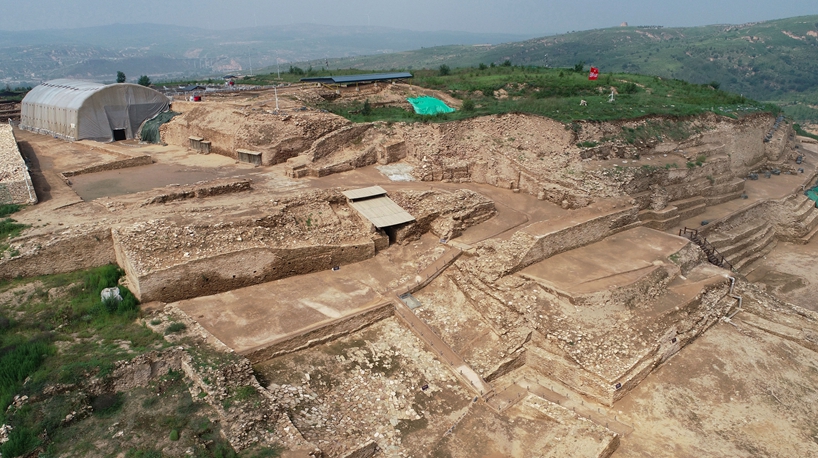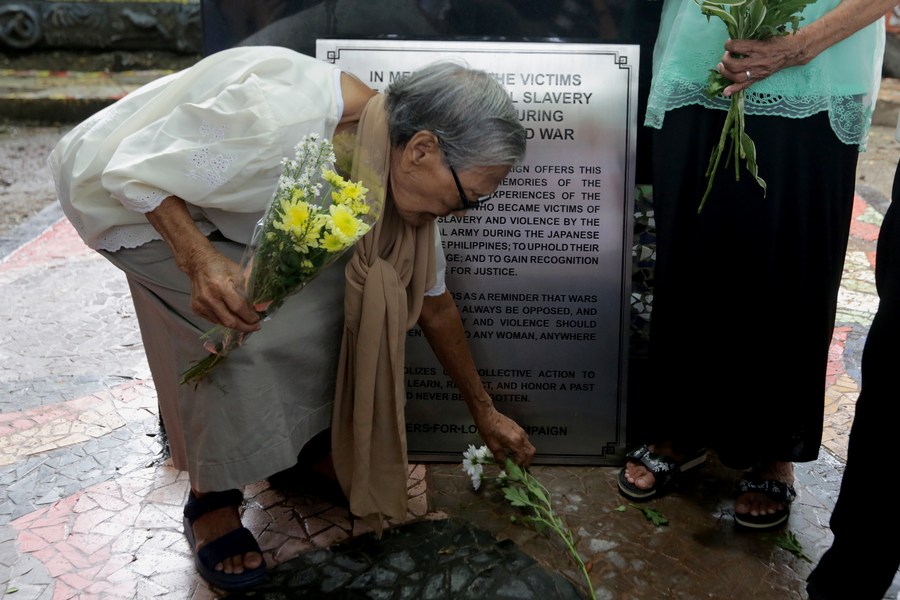
Photo taken on Aug. 25, 2019 shows former Filipino "comfort woman" Estelita Dy (L), presenting flowers to a historical marker titled "In Memory of the Victims of Military Sexual Slavery and Violence During the Second World War" in Paranaque City in Metro Manila, the Philippines. (Xinhua/Rouelle Umali)
The aging "Lolas," the Filipino "comfort women" victims, are struggling for an apology from Japan. "I will not stop. If I die, my children and grandchildren will continue the fight. We will continue to renounce war because we do not want the next generation to experience what we went through," a Lola has said.
MANILA, Aug. 14 (Xinhua) -- As one of the Philippine women forced into sexual slavery by Japanese troops during World War II, Isabelita Vinuya, from Pampanga province, lived in the hope that she would get justice from the Japanese government for their mass violence nearly eight decades ago.
The hope to live long enough to receive the apology compensation for her ordeal as a "comfort woman" died on Nov. 23, 2021, when Vinuya succumbed to pneumonia at age 89.
Like many victims of Japanese wartime atrocities, Vinuya passed away without seeing justice. "Lola," a Tagalog word that means grandmother, refers to the aging Filipino "comfort women" victims as a group. What happened to Vinuya could also happen to other Lolas.
According to Sharon Silva, coordinator of non-profit organization "Lila Pilipina" (League of Filipino Grandmother), which helps Lolas seek justice, more than 1,000 Filipino women were forced to serve as sex slaves for the Japanese aggressors when Japan occupied the Philippines from December 1941 until its defeat in August 1945.
In 2012, the day of Aug. 14 was designated the International Memorial Day for "Comfort Women" by the 11th Asian Alliance Conference for "Comfort Women."
Among the Filipino victims, 174 became members of Lila Pilipina, while around 90 others grouped themselves as Malaya Lolas when they all made public their experiences in the 1990s.
The Lolas are now in their 90s, and many of them are sickly and poor. Silva refused to tell the number of alive victims, fearing that the fading group might be flagrantly ignored by the Japanese government.
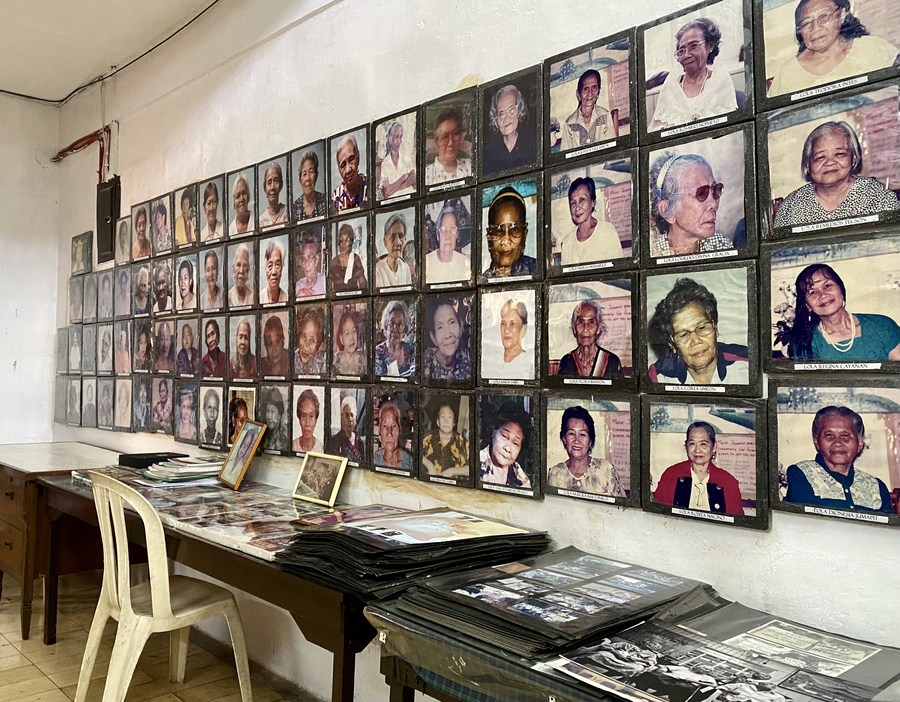
The portraits of victims are shown on the wall of "Lila Pilipina," a non-profit organization that helps "comfort woman" victims seek justice, in Quezon City, a suburb of the Philippine capital, on July 29, 2022. (Xinhua/Liu Kai)
The "Lila Pilipina" office in Quezon City, a suburb of the Philippine capital, is a small memorial hall for Lolas. An entire wall is covered with photos of Lolas, silently complaining about the heinous crimes committed by the Japanese troops.
Silva told Xinhua that the atrocities the Lolas suffered were horrible.
"In the case of Lola Estelita, she was a 13-year-old girl when she was caught by a Japanese militarist and brought to a house, where she became a 'comfort woman' for about three weeks," said Silva, adding that another victim even witnessed the massacre of her family right in front of her eyes, before she and two other sisters were taken to a garrison.
The horrific sexual violence left the Lolas with nightmare memories, lifelong disabilities, and severe trauma, both mentally and physically.
"They never got jobs. Some of them never got legally married. Most of them never traveled. Some of them never had kids," said Silva.
"Many of them never really got out of poverty," she added.
For Silva, a dwindling number of Lolas means they may not be able to wait for a formal and sincere apology from the Japanese government even till their deaths.
"They demand justice. First and foremost, an apology from the Japanese government. Also, this history must be reflected in the history textbooks for young people to learn and remember it," said Silva.
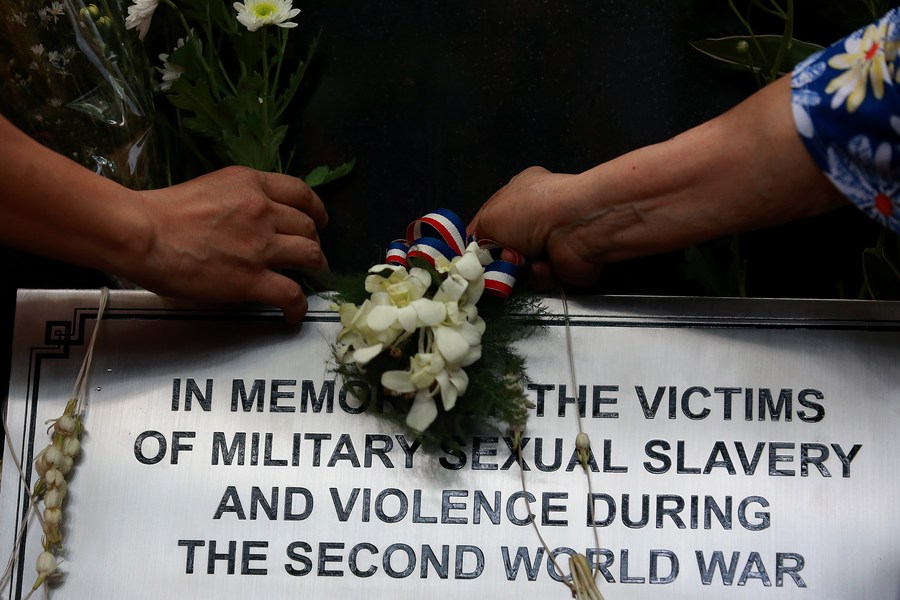
People present flowers to a historical marker titled "In Memory of the Victims of Military Sexual Slavery and Violence During the Second World War" in Paranaque City in Metro Manila, the Philippines, Aug. 25, 2019. (Xinhua/Rouelle Umali)
In December 2017, a memorial statue of "comfort women" was inaugurated on the banks of Manila Bay, drawing strong protests from the Japanese government.
Four months later, the statue was removed under Tokyo's constant diplomatic pressure, and the artist who built it was even threatened.
According to Silva, another "comfort women" memorial statue in Laguna Province was also ordered to be removed just three days after its installation due to pressure from the Japanese government.
In recent years, some forces in Japan continue to deny the forced recruitment of "comfort women," apparently in an attempt to whitewash Japan's history of aggression. Silva worries that Japan has been instilling twisted history into the heads of the young generation by adopting history-distorting textbooks, leaving them with incorrect historical views of Japan's role in WWII.
"I think it has long been trying to circumvent the peace clause in Japan's pacifist constitution, which forbade them to send soldiers abroad for war purposes," said Silva.
"There should be no more war," she added, saying some Lolas always tried to talk to young people, especially young women, to be vigilant against all kinds of colonial wars so that their tragedy will no longer happen again.
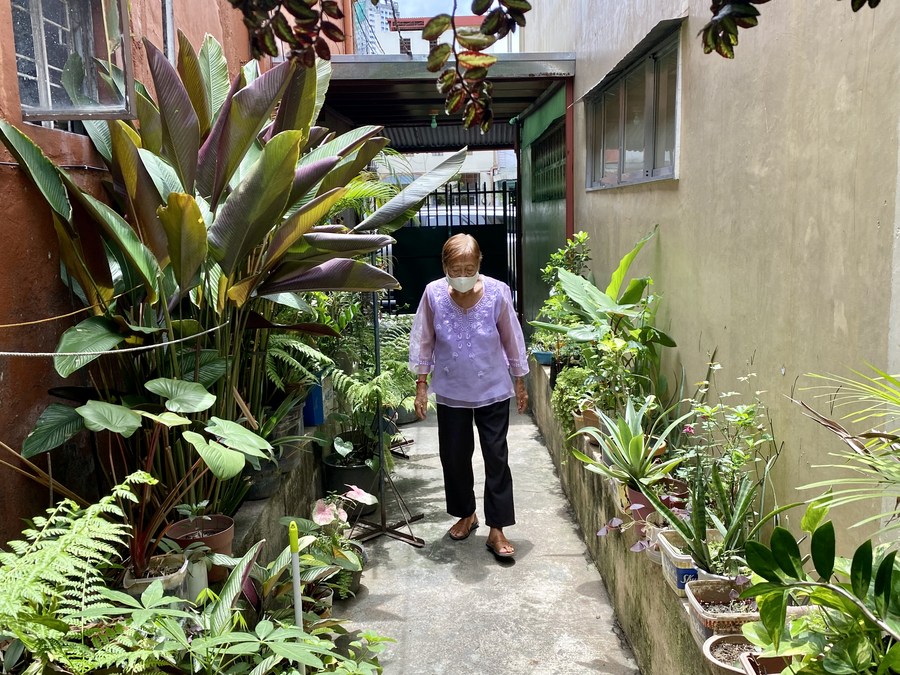
Estelita Dy walks outside the office of "Lila Pilipina," a non-profit organization that helps "comfort woman" victims seek justice, in Quezon City, a suburb of the Philippine capital, on July 29, 2022. (Xinhua/Liu Kai)
Estelita Dy, 92, is continuing the fight. Nearly eight decades have passed, and the traumatic ordeal that she suffered continues to haunt her like a recurring nightmare.
In 1944, 14-year-old Dy was kidnapped by Japanese soldiers while selling vegetables, eggs, and chickens at a market in Bacolod City in the central Philippines.
"I just cried and covered my eyes with my hands every time they raped me," Dy recalled in an interview with Xinhua, with her voice cracked. "Once, the soldiers hit my head so hard that I was knocked out for about three days."
In 1945, Dy decided to leave her hometown for Manila, fearing that people would know about her ordeal if she stayed in the village. In the Philippine capital, Dy worked and tried to forget her bitter experience.
While in Manila, Dy was married and had six children but kept silent about her past trauma until she heard testimony from other victims of Japanese sexual violence.
Like the other victims, Dy kept her wartime ordeal secret because of fear of rejection. "I never told my husband about what happened to me because I was ashamed of being raped," she said.
It was not until 1993 that she finally took the courage to come out in the open to tell her wartime ordeal.
Despite her poverty and frail health, Dy has tirelessly joined fora and protest rallies with other Lolas to demand a formal apology and compensation from the Japanese government.
She now lives with his daughters in a tiny house in Manila's Malabon district, and depends on her children for daily food and medical expenses.
"I will not stop. If I die, my children and grandchildren will continue the fight. We will continue to renounce war because we do not want the next generation to experience what we went through," Dy said.■






